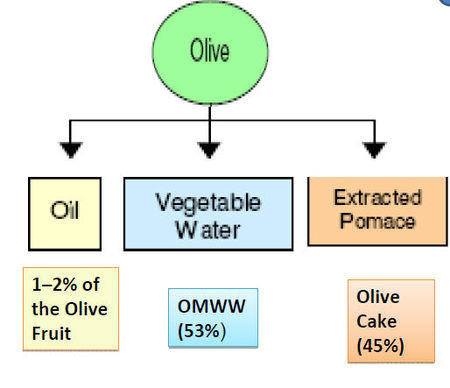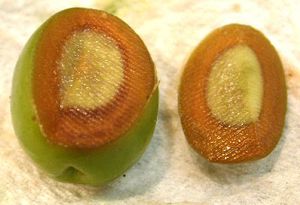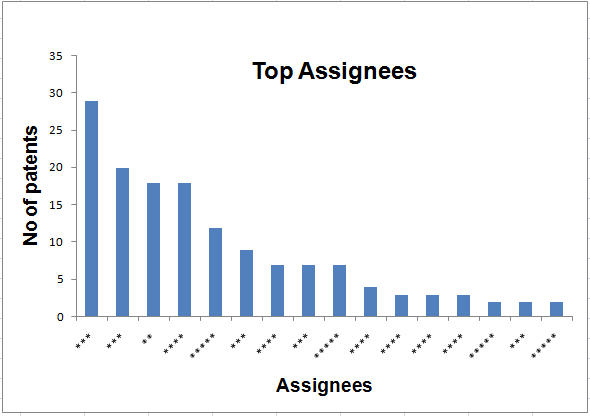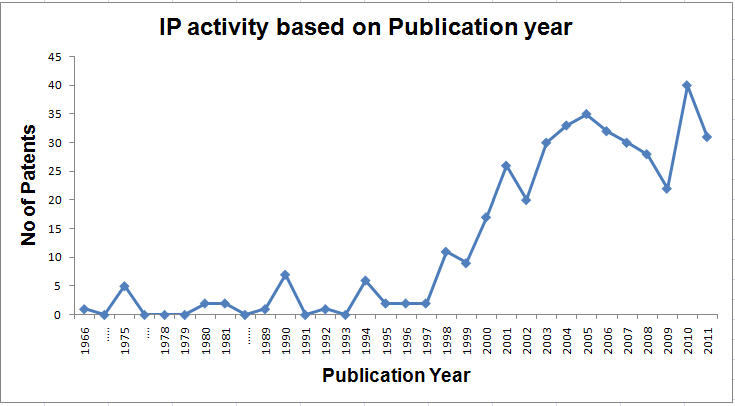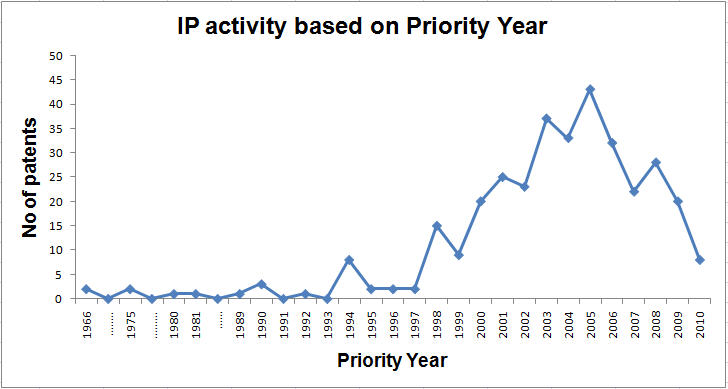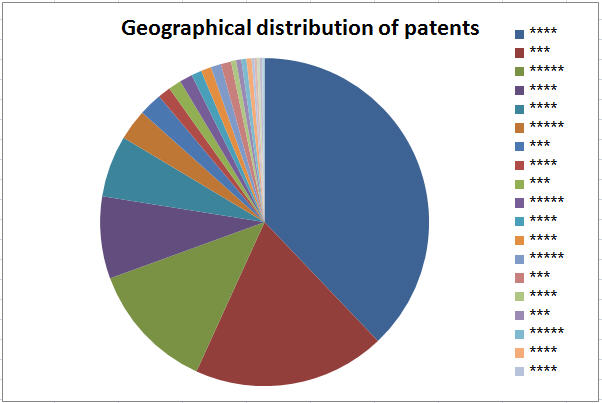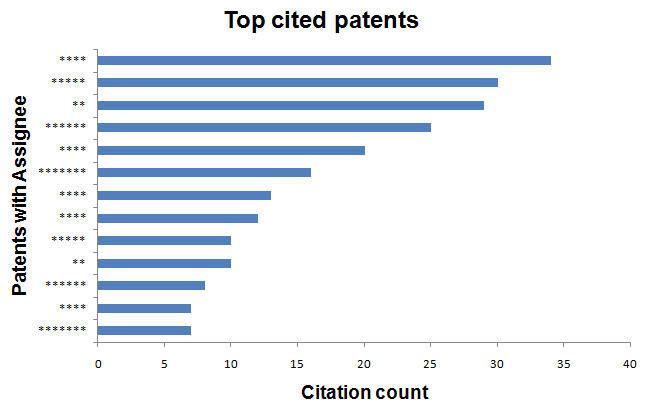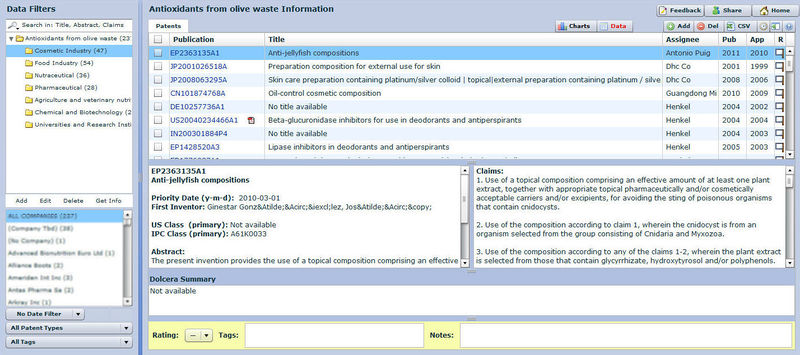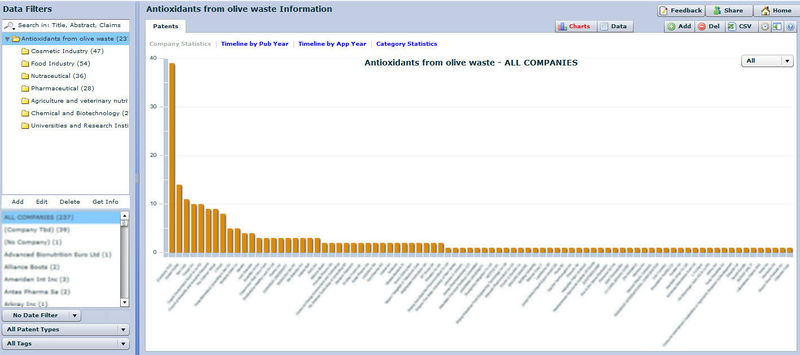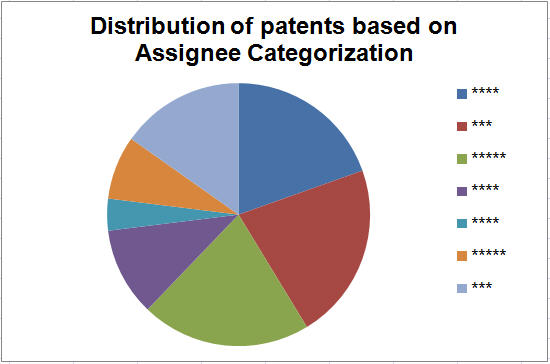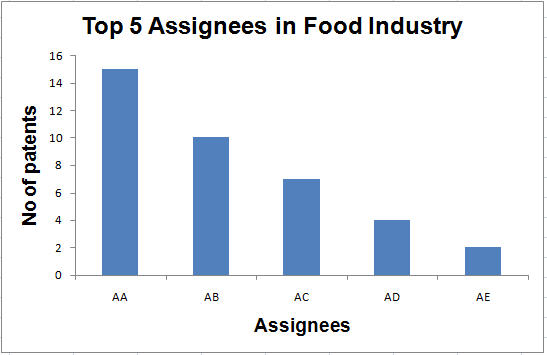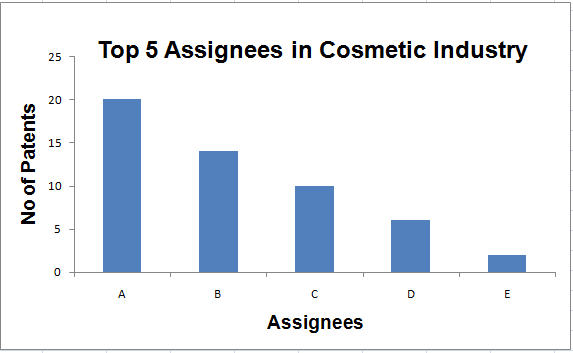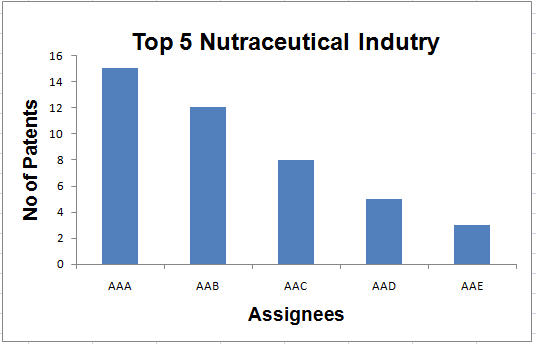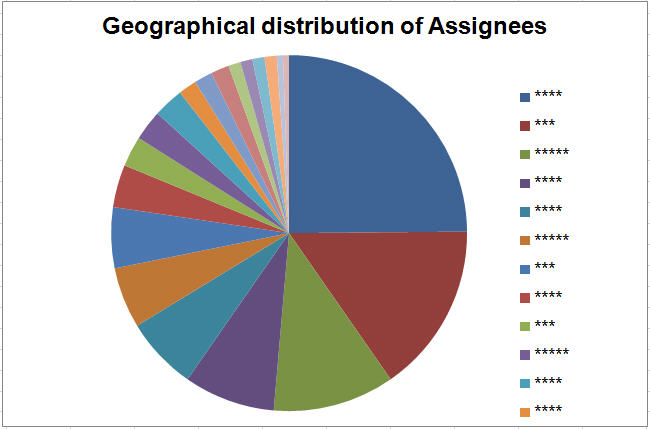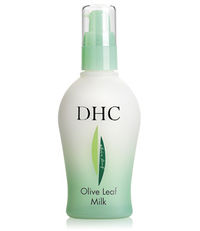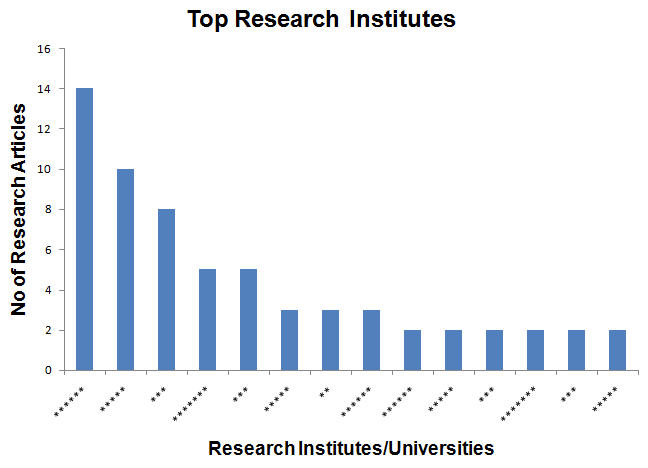Antioxidants form olive waste
Contents
- 1 Objective
- 2 Search methodology
- 3 Background
- 4 Antioxidants in olive waste
- 5 Concept table
- 6 IPC class codes
- 7 US class codes
- 8 Search strategy
- 9 Final Query
- 10 Interactive Taxonomy
- 11 Relevant Patents (sample set)
- 12 Sample patent analysis sheet
- 13 Assignee Analysis and IP Activity
- 14 Dashboard
- 15 Patent Product Mapping
- 16 Articles Search
- 17 Purchase Information
Objective
To create a technology landscape report on Antioxidants form Olive waste
- Identify market players with prolific IP activity in the technology area
- Segment the players by the industry they belong to
Note: This report is just a template and gives an indication of what the paid report contains.
Click here for information to purchase the report
Search methodology
| Search strategy | 1. Various keywords are retrieved for conducting the search related to antioxidants from olive waste from pubmed mesh, relevant patents, scientific articles and thesaurus. 2. The database used for patent search is Thomson innovation. |
| Keywords | Olive waste, By-products, Antioxidants etc. |
Background
Fruit and vegetable processing has increased considerably during the last 25 years and this generates substantial quantities of waste/by-products. These wastes are often disposed of as landfill, land-spreading, or as animal feed or fertilizers. But in last few years, efficient, inexpensive and environmentally sound utilization of these materials is becoming more important and hence new methods for waste handling and treatment have been introduced in the recovery, bioconversion, and utilization of valuable constituents from food wastes.Waldron
Olea europaea L. is a typical tree widely cultivated for oil production in the Mediterranean area, they are rarely consumed as a natural fruit due to their extreme bitterness hence they are widely used for the extraction of oil Bouaziz et al.This olive oil industry generates large amounts and varieties of wastes, which remain most of potentially interesting compounds.
- Olive oil production products Taka:
- Olive oil (20%).
- Semi-solid waste (30%)
- Aqueous liquor (50%).
- Solid waste (olive oil cake (OOC) or “orujo”) is a combination of olive pulp and stones.
- Aqueous liquor comes from the vegetation water and “alpechin" or olive-mill waste water (OMWW).
- Two-phase processing technique in which no water is added, generates oil and a new by-product called “alperujo, alpeorujo or twophase olive mill waste” which is a combination of liquid and solid waste. Bolanos et al
Antioxidants in olive waste
During the production of olive oil 80% of the olive fruit is discarded as waste, over 10 million tons per year of solid or semisolid wastes are produced worldwide in the olive industry, whose storage and/or recycling represent a serious environmental problem due to its high content in organic matter.However these wastes are rich in polyphenols, including hydroxytyrosol Schaffer et al. Olive fruits, olive leaves, olive oil and olive mill wastewater all of them have attracted considerable attention as valuable sources of biophenols Bouaziz et al.Biophenolic fraction of olive oil comprises only 1-2% of the total phenolic content of the olive fruits, while the remaining 53% and 45% being lost in oil mill waste (OMW) and olive cake.Consequently, with more than 30 phenolic compounds, OMW is now regarded as a potent source of natural antioxidants. Taka
Oleuropein is the major secoiroid compound of unripe olive fruit and the glucoside of hydroxytyrosol is the predominant phenolic in ripe olives. Olive fruits also contain other secoiroids such as verbascoside and ligustroside. Other groups of phenolic compounds are derived from cinnamic (p-cumaric, ferulic and cafeic acid) and benzoic acids. Other phenols found in olive pulp are catechol, methylcatechol, phenylalchols (tyrosol, hydroxytyrosol), high concentrations of flavonoids and several anthocyanin pigments.The main phenolic compounds present in virgin olive oil are tyrosol, hydroxytyrosol, its secoiroids and conjugate forms (oleuropein, ligustroside, verbascoside) and lignans (pinoresinol and acetopinoresinol). During the olive oil mechanical process, the major proportion of the phenolic compounds are found in the aqueous phase, while only a minor percent (<1%) are located in the olive oil this explains why a large fraction of phenolics can be found in the alpechin and alperujo. Therefore, both residues seem to be an affordable and abundant source of natural antioxidants Bolanos et al.
- Polyphenols present in different parts of olive plant
| Olive Bark | Olive Branches | Olive stones |
| Hydroxytyrosol | Hydroxytyrosol | Pinoresinol |
| Tyrosol | Tyrosol | Hydroxy pinoresinol |
| Oleuropein | Oleuropein | |
| Ligstroside | Verbascoside | |
| Taxifolin |
Concept table
Title : Antioxidants from olive waste
| S.No | English Keywords | German Keywords | French Keywords | |||||||
| Concept One | Concept Two | Concept Three | Concept Four | Concept Two | Concept Three | Concept Four | Concept Two | Concept Three | Concept Four | |
| 1 | Olive | Waste | Antioxidant | Recovery | Abfall | Antioxidans | Erholung | déchets | antioxydant | Récupération |
| 2 | Olea europaea L | By-product | Phenols | Removal | Nebenprodukt | Phenole | Entfernung | Par-produit | phénols | suppression |
| 3 | ***** | ***** | ***** | ***** | **** | ****** | **** | *** | ****** | ******** |
| 4 | ******** | *** | ******** | *** | ******* | ********* | ****** | **** | **** | *********** |
- An indicative list of terms to show how a concept table is generated. View paid report for complete list.
- Concept Table was enriched by searches related to olive waste and antioxidants from pubmed mesh, relevant patents, scientific articles and various thesauri
IPC class codes
| Concept | Code | Definition |
| Waste | C02F | Treatmentof water, waste water, sewage, or sludge |
| 103/32 |
| |
| Olive |
A61K | Preparations for medical, dental, or toilet purposes |
| 36/63 |
| |
| Antioxidant<br##DeleteCell##> | A61K | Preparations for medical, dental, or toilet purposes |
| 31/05 |
| |
| Removal Process | C02F | Treatmentof water, waste water, sewage, or sludge |
| 1/04 |
|
US class codes
| Concept | Codes | Definition |
| Waste | 554 |
Organic compounds |
| 554/177 |
Recovering from industrial waste materials | |
| Olive | 424 | Drug, bio-affecting and body treating compositions |
| 424/769 | Containing or obtained from a tree having matured height of a least two meters | |
| Antioxidant | 424 | Drug, bio-affecting and body treating compositions |
| 424/725 | Plant material or plant extract of undetermined constitution as active ingredient | |
| Removal Process | 210 | Liquid purification or separation |
| 210/600 | processes |
- An indicative list of various class codes used for the IP search. View paid report for complete list.
Search strategy
- Search Engine: Thomson Innovation
- Database Coverage: US, Europe, German, Japanese and Korean applications and granted patents
- Scope: Title, Abstract and Claims
- Timeline : 1900 to 2011
- Date of search : 20/09/2011
| S.No | Concept | Query | No of Hits |
| 1 | Full keywords (Olive + Waste + Antioxidants + Removal process) | Olive*** | ##### |
| 2 | (Olive + Waste + Antioxidants) keywords AND (Removal process) class codes | Olive*** AND C02F000100*** |
### |
| 3 | (Olive + Waste + Removal process) keywords AND (Antioxidants) class codes | Olive*** AND A61K003105*** |
#### |
| 4 | (Olive + Removal process + Antioxidants) keywords AND (Waste) class codes | Olive**** AND C11B001300**** |
## |
| 5 | (Waste + Antioxidant + Removal process) keywords AND (Olive) class codes | Waste*** AND A61K003663**** |
#### |
| 6 | Combined query | 2 OR 3 OR 4 OR 5 | #### |
| 7 | Not query | 1 NOT 6 | ###( Non relevant patents) |
| 8 | (Olive + Waste + Antioxidants) keywords AND (Applications) class codes | Olive**** AND A61Q*** |
### |
| 9 | Combined query | 6 OR 8 | #### (### unique hits) |
Final Query
- Year : 1900 to 2011
| S.No | Scope | Query | No of Hits |
| 1 | Claims,Abstract and Title | (English) OR (Japanese) OR (French) OR (German) | #### (#### unique hits) |
Interactive Taxonomy
Relevant Patents (sample set)
| S.No | Patent/ Publication Number | Assignee/Applicant | Publication Year | Title | Focus | Summary |
| 1 | EP2338500 | Phenofarm S.r.l., Romani, Annalisa, Pizzichini, Massimo | 2011 | Process for producing concentrated and refined actives from tissues and byproducts of Olea europaea with membrane technologies | Producing powders and concentrated solutions consisting active compounds. | Powder and concentrated solutions containing antioxidants (hydroxytyrosol, oleuropein etc) are extracted from olive tree residues by integrating various separtion techniques such as micro, nano filteration and reverse osmosis. |
| 2 | US20100240769 | Phenoliv AB, Lund (SE) | 2010 | Olive waste recovery | Isolation of polyphenols and dietary fibers from olive mill waste | Ployphenols (PP) and deitary fibers (DF) are extracted simultaneously from olive mill waste water using solvent extraction procedure, separation of PP from DF is effected through centrifugation and precipitation process. |
Sample patent analysis sheet
Assignee Analysis and IP Activity
- Labels for all the charts below are available in the paid report.
- The following graphs explain the placement of the different assignees in this area.
- The graphs given below explain the IP activity in this area over the years.
- Geographical distribution of Patents
- Top Cited patents
- Patents with the maximum number of forward citations were determined and the graph shows the top 13 patents with corresponding assignees.
Dashboard
- The assignees have been categorized into following areas:
- Food Companies
- Cosmetic Companies
- Nutraceutical companies
- Pharmaceutical Companies
- Agriculture and veterinary nutrition Companies
- Chemical and Biotechnology companies
- Universities and Research Institutes
A data preview of the dashboard is shown below:
A chart preview of the dashboard is shown below:
Distribution of patents between assignees
- Top 5 players in Food, Cosmetic and Nutraceutical Sectors:
Patent Product Mapping
- Some products with respect to this technology area were identified and mapped to the patents from their respective assignees.
| S.NO | Patent No | Title | Assignee | Products | Product Image |
| 1 | AU2007203440 | Method of obtaining a hydroxytyrosol-rich composition from vegetation water | Creagri Inc | HIDROX | |
| 8 | JP2001026518 | Preparation Composition for external use for skin | DHC CO | Olive Leaf Milk |
Articles Search
- Search Strategy
- Database : Scirus
- Timeline : 1990 - 2011
- Subject Areas : Agricultural and Biological Sciences, Chemistry and Chemical Engineering, Engineering, Energy and Technology,Environmental Sciences,Life Sciences, Medicine, Pharmacology.
| S.No | Concept | Search string | No of Hits |
| 1 | (Olive + Waste + Antioxidants) Keywords | ("Olive*" OR "Olea europaea"*****) And ("waste*" OR "by product*"********) And ("antioxidant*"*****) |
### (##% Relevancy) |
Relevant articles
Click here to download the relevant articles sheet
- The following graphs explain the placement of different Research Institutes and Universities in this area.
Purchase Information
Contact information for purchasing this report:
- Email: info@dolcera.com
- Phone: +1-650-269-7952, +91-40-2355-3493

